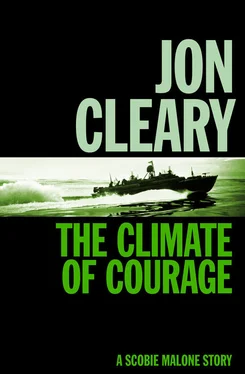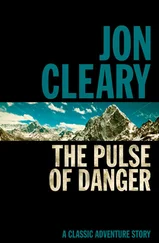“Well, they’d better get used to the grandiloquent bull. He’s here as boss.”
“Blamey won’t like that.”
“Blamey will look after himself,” Fredericks said with a grin. “I’m no admirer of him personally, but he’s the bloke we want if we’re to have any say in the way things are run. MacArthur reckons he has God on his side. He’ll need Him, if he’s to push Tom Blamey around.” Then he tossed the two generals out the window and said, “How much leave have you?”
“Eight days. I report back next Monday morning to Ingleburn. Where we go from there, and when, I haven’t the faintest.”
“Righto, call me at home Sunday. It’s still the same place, Macleay Street, and the number is in the book. You just need an American visa to come up there now, that’s all. How are the wife and kids?”
“Fine. I’m like a stranger in the house, seeing them for the first time. I just sit back and admire the three of them, and feel bloody proud of myself.”
“Good for you.” Fredericks extended a plump hand across the desk; Vern had forgotten the strength, in the plump fingers. “I’m glad to see you got back all right, Vern.”
Vern said good-bye to Fredericks, promising to give a lot of thought to the war correspondent offer, and went out to the lift. It was operated now by a girl, instead of the World War 1 veteran who had been there for years (had he gone back into the Army? Some people didn’t know when enough was enough. But Vern had noticed when war first broke out that the older men had rushed just as quickly as the young men to enlist). The girl was a blonde who munched on bubble gum, and gave him a franker stare than he had been accustomed to from Australian girls before the war. She stood leaning on the power handle, one hip thrown out in an attempt at dislocation that was supposed to be provocative, a bubble now and again hanging from her lips like an ectoplasmic burp. She stared at him again as the lift bounced gently to a stop.
“Ground floor, loo-tenant.”
“Thanks, babe,” said Vern, and winked at her as he got out. She smiled and watched him as he went out to the street, her hip still thrown out, still blowing bubbles, one hand stroking the blonde hair. Some of these Aussie boys weren’t bad when you came to think of it. Why, her sister Elsie had even married one….
Vern, unaware that he had almost been tagged as eligible, had turned out of Elizabeth Street and into Martin Place. He walked down and turned into George Street and was walking against the crowd as he headed down towards the harbour. The faces came swimming towards him above the dark river of bodies. He looked for signs of worry or panic, but there was none. True, some faces were unhappy, the eyes a little dead and the mouths drooping in self-pity, but the unhappiness was personal: a husband had been killed, a girl had given back an engagement ring, there were bills to be paid and no money. But there was no general mask of concern, no nervous attitude that showed the crowd knew danger was just around the corner. The Australian had always had the reputation of being easy-going: to Vern’s suddenly acute and worried eye, he had never looked more easy-going than now. Vern walked on, beginning to have the first doubts that the country would have what was needed when the time came.
He skirted the wharves of Circular Quay and climbed the steps to the Bridge and walked out into the middle. He stood there and looked out at home. It was an Australian early autumn day, no hint of dying in it, and the upper sky was streaked with thin cloud that looked like the brushings of a white wind. The light was clear and fine, and everything, even the smoke from ships in the harbour, had an edge to it. The sun put a silver sheen on the afternoon air and everything glittered with the sharpness of a poignant memory.
Above him the arch of the Bridge reared against the sky, a heavy tracery of steel touched with sun that went in a single curving leap from pylon to pylon, and the pylons themselves towered like bleached medieval forts above the polished harbour. The coloured roofs of Milson’s Point and Mosman stretched away over their hills with a pointillism effect that danced before the eyes. A ferry came across the water, its hooter protesting in a sharp moan at nothing at all, and an American naval launch went over towards Garden Island, spreading a cool white fan behind it. Beyond the island he could see the grey shapes of an American cruiser and some destroyers; he looked away from them, a reminder of how close the war had come to home, and up towards the city. The buildings were stacked in confusion on top of each other, their windows flashing like small explosions and the shadows stretching down between them like black bombing scars. Already, he thought, the war is giving me my similies: I’m half-way to being a war correspondent.
He turned and walked back along the Bridge, now and again turning his head to look back at the harbour and the city sprawled about the hills. It all looked good, better even than the memory that had changed almost imperceptibly, like a growing child, as time had dripped down out of the glass and the desire to come home had grown stronger.
Home was where people worshipped racehorses and took no pride in work and drove the seeds of their culture overseas; but he didn’t want it invaded nor did he want to leave it ever again.
“They offered me a job to-day as a war correspondent,” he said.
“Gee, that’s wonderful, Daddy,” said Jill, and hastily swallowed a lump of meat. “My, won’t the girls at school like this! Someone glamorous in the family!”
“Thank you,” said Dinah. “Let me tell you, when I was in the chorus I was called glamorous, seductive——”
“Ah, you’re all right, Mum,” said Michael. “But being a chorus girl isn’t like being a war correspondent.”
“I told one of the nuns the other day that my mother had been a hoofer,” said Jill. “She said she’d say a rosary for you.”
“That’s nice,” said Dinah. “Tell her in return I’ll put on my tights and do a bit at the school concert.” She stabbed at a piece of kidney. “A hoofer!”
Michael was looking at his father. “Where will you go, Dad? Up to New Guinea? Will you get your name on your stories? Heck, I hope there’s a war on when I grow up——”
“If there is,” said Dinah, “I’ll see you get a nice soft cop in a reserved occupation.”
She said it without any particular emphasis, but Vern looked along the table at her. She smiled at him, a smile as unreadable as a chorus girl’s. “Go on, darling. Did you take the job?”
“I haven’t decided.”
“Ah, ’struth!” Michael carved at the air with his knife, disgusted with a father who didn’t recognise opportunity when it knocked. “Someone else will get it if you don’t hurry up! I bet everyone on the paper wants——”
“Don’t you want it, Daddy?” said Jill.
She was eleven, small but well-built, with her mother’s feature’s and her father’s colouring, but with the temperament of neither of them. She already had all the poise that Vern had spent years trying to acquire; a trick of retiring into herself that made her completely beyond and independent of what went on about her; and an intelligence that sometimes dismayed Dinah.
Vern looked at her, aware that, with her uncanny sense of feeling, she knew something was troubling him. “I don’t know. It’s not something I can just say yes to, just like that——”
“I could,” said Michael. “Ask me.”
Dinah was the first to admit that her brain was little better than a chorus girl was required to have, but like her daughter she could sense when anything was worrying Vern. “Righto, Michael, we’ll ask you when you leave school, in six or seven years’ time. Now get on with your eating and let’s forget all about the glamour.”
Читать дальше












